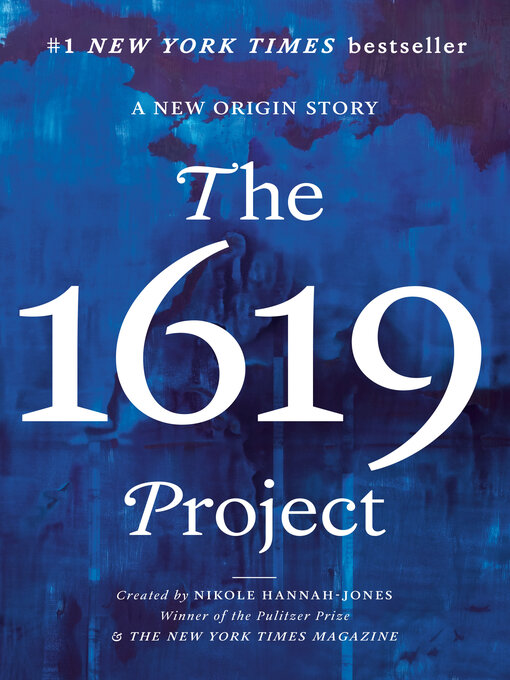- Available now
- New eBook additions
- New kids additions
- New teen additions
- Most popular
- Try something different
- See all
-
Description
-
Creators
-
Details
-
Reviews
“[A] groundbreaking compendium . . . bracing and urgent . . . This collection is an extraordinary update to an ongoing project of vital truth-telling.”—Esquire
NOW AN EMMY-NOMINATED HULU ORIGINAL DOCUSERIES • FINALIST FOR THE KIRKUS PRIZE • ONE OF THE BEST BOOKS OF THE YEAR: The Washington Post, NPR, Esquire, Marie Claire, Electric Lit, Ms. magazine, Kirkus Reviews, Booklist
In late August 1619, a ship arrived in the British colony of Virginia bearing a cargo of twenty to thirty enslaved people from Africa. Their arrival led to the barbaric and unprecedented system of American chattel slavery that would last for the next 250 years. This is sometimes referred to as the country’s original sin, but it is more than that: It is the source of so much that still defines the United States.
The New York Times Magazine’s award-winning 1619 Project issue reframed our understanding of American history by placing slavery and its continuing legacy at the center of our national narrative. This book substantially expands on that work, weaving together eighteen essays that explore the legacy of slavery in present-day America with thirty-six poems and works of fiction that illuminate key moments of oppression, struggle, and resistance. The essays show how the inheritance of 1619 reaches into every part of contemporary American society, from politics, music, diet, traffic, and citizenship to capitalism, religion, and our democracy itself.
This book that speaks directly to our current moment, contextualizing the systems of race and caste within which we operate today. It reveals long-glossed-over truths around our nation’s founding and construction—and the way that the legacy of slavery did not end with emancipation, but continues to shape contemporary American life.
Featuring contributions from: Leslie Alexander • Michelle Alexander • Carol Anderson • Joshua Bennett • Reginald Dwayne Betts • Jamelle Bouie • Anthea Butler • Matthew Desmond • Rita Dove • Camille T. Dungy • Cornelius Eady • Eve L. Ewing • Nikky Finney • Vievee Francis • Yaa Gyasi • Forrest Hamer • Terrance Hayes • Kimberly Annece Henderson • Jeneen Interlandi • Honorée Fanonne Jeffers • Barry Jenkins • Tyehimba Jess • Martha S. Jones • Robert Jones, Jr. • A. Van Jordan • Ibram X. Kendi • Eddie Kendricks • Yusef Komunyakaa • Kevin M. Kruse • Kiese Laymon • Trymaine Lee • Jasmine Mans • Terry McMillan • Tiya Miles • Wesley Morris • Khalil Gibran Muhammad • Lynn Nottage • ZZ Packer • Gregory Pardlo • Darryl Pinckney • Claudia Rankine • Jason Reynolds • Dorothy Roberts • Sonia Sanchez • Tim Seibles • Evie Shockley • Clint Smith • Danez Smith • Patricia Smith • Tracy K. Smith • Bryan Stevenson • Nafissa Thompson-Spires • Natasha Trethewey • Linda Villarosa • Jesmyn Ward

- Nikole Hannah-Jones - Other
- The New York Times Magazine - Other
- Caitlin Roper - Editor
- Ilena Silverman - Editor
- Jake Silverstein - Editor
OverDrive Read
- ISBN: 9780593230589
- Release date: November 16, 2021

Loading
Formats
OverDrive Read
subjects
Languages
English
Levels
Lexile® Measure:860
Text Difficulty:4-5
